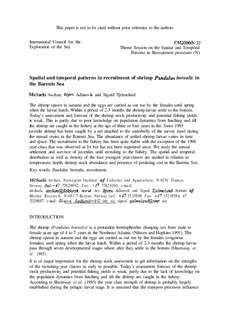Spatial and temporal patterns in recruitment of shrimp Pandalus borealis in the Barents Sea
Working paper

Åpne
Permanent lenke
http://hdl.handle.net/11250/100477Utgivelsesdato
2000Metadata
Vis full innførselSamlinger
Originalversjon
This report is not to be quoted without prior consultation with the General Secretary.Sammendrag
The shrimp spawn in autumn and the eggs are carried as out roe by the females until spring
when the larvae hatch. Within a period of 2-3 months the shrimp larvae settle to the bottom.
Today’s assessment and forecast of the shrimp stock productivity and potential fishing yields
is weak. This is partly due to poor knowledge on population dynamics from hatching and till
the shrimp are caught in the fishery at the age of three or four years in the. Since 1995
juvenile shrimp has been caught by a net attached to the underbelly of the survey trawl during
the annual cruise in the Barents Sea. The abundance of settled shrimp larvae varies in time
and space. The recruitment to the fishery has been quite stable with the exception of the 1996
year-class that was observed as l+ but has not been registered since. We study the annual
settlement and survivor of juveniles until recruiting to the fishery. The spatial and temporal
distribution as well as density of the four youngest year-classes are studied in relation to
temperature, depth, shrimp stock abundance and presence of predating cod in the Barents Sea.
Utgiver
ICESSerie
ICES CM documents2000/N:32